- Home
- Wendell Berry
Fidelity Page 2
Fidelity Read online
Page 2
“It’s a wonder,” she said, “that Mat didn’t kill Thad Coulter that morning.”
I said, “Granddad?”
And then she told me the story. She told it quietly, looking through the window into that July morning in 1912. Her hands lay in her lap and never moved. The only effect her telling had on her was a glistening that appeared from time to time in her eyes. She told the story well, giving many details. She had a good memory, and she had lived many years with her mother-in-law, who also had a good one. I have the impression that they, but not my grandfather, had pondered together over the event many times. She spoke as if she were seeing it all happen, even the parts of it that she had in fact not seen.
“If it hadn’t been for Jack Beechum, Mat would have killed him,” my grandmother said.
That was the point. Or it was one of the points—the one, perhaps, that she most wanted me to see. But it was not the beginning of the story. Adam and Eve and then Cain and Abel began it, as my grandmother depended on me to know. Even in Thad Coulter’s part of the story, the beginning was some years earlier than the July of 1912.
Abner Coulter, Thad’s only son, had hired himself out to a grocer in Hargrave. After a few years, when he had (in his own estimation) learned the trade, he undertook to go into business for himself in competition with his former employer. He rented a building right on the courthouse square. He was enabled to do this by a sizable sum of money borrowed from the Hargrave bank on a note secured by a mortgage on his father’s farm.
And here Thad’s character enters into the story. For Thad not only secured his son’s note with the farm that was all he had in the world and that he had only recently finished paying for but he further committed himself by bragging in Port William of his son’s new status as a merchant in the county seat.
“Thad Coulter was not a bad man,” my grandmother said. “I believed then, and I believe now, that he was not a bad man. But we are all as little children. Some know it and some don’t.”
She looked at me to see if I was one who knew it, and I nodded, but I was thirty then and did not know it yet.
“He was as a little child,” she said, “and he was in serious trouble.”
He had in effect given his life and its entire effort as hostage to the possibility that Abner, his only son, could be made a merchant in a better place than Port William.
Before two years were out, Abner repaid his father’s confidence by converting many small private fritterings and derelictions into an undisguisable public failure and thereupon by riding off to somewhere unknown on the back of a bay gelding borrowed ostensibly for an overnight trip to Port William. And so Thad’s fate was passed from the reckless care of his son to the small mercy of the law. Without more help than he could confidently expect, he was going to lose his farm. Even with help, he was going to have to pay for it again, and he was close to sixty years old.
As he rode home from his interview with the Hargrave banker, in which the writing on the wall had been made plain to him, he was gouging his heel urgently into his mule’s flank. Since he had got up out of the chair in the banker’s office, he had been full of a desire as compelling as thirst to get home, to get stopped, to get low to the ground, as if to prevent himself from falling off the world. For the country that he had known all his life and had depended on, at least in dry weather, to be solid and steady underfoot had suddenly risen under him like a wave.
Needing help as he did, he could not at first bring himself to ask for it. Instead, he spent most of two days propped against a post in his barn, drinking heavily and talking aloud to himself about betrayal, ruin, the coldheartedness of the Hargrave bankers, and the poor doings of damned fools, meaning both Abner and himself. And he recalled, with shocks of bitterness that only the whiskey could assuage, his confident words in Port William about Abner and his prospects.
“I worked for it, and I come to own it,” he said over and over again. “Now them will own it that never worked for it. And him that stood on it to mount up into the world done run to perdition without a patch, damn him, to cover his ass or a rag to hide his face.”
When his wife and daughter begged him to come into the house, he said that a man without the sense to keep a house did not deserve to be in one. He said he would shelter with the dogs and hogs, where he belonged.
The logical source of help was Ben Feltner. Ben had helped Thad to buy his farm—had signed his note and stood behind him. Ben was his friend, and friendship mattered to Ben; it may have mattered to him above all. But Thad did not go to Ben until after his second night in the barn. He walked to Ben’s house in Port William early in the morning, drunk and unsteady, his mind tattered and raw from repeated plunges through the thorns and briars of his ruin.
Ben was astonished by the look of him. Thad had always been a man who used himself hard, and he had grown gaunt and stooped, his mouth slowly caving in as he lost his teeth. But that morning he was also soiled, sagging, unshaved and uncombed, his eyes bloodshot and glary. But Ben said, “Come in, Thad. Come in and sit down.” And he took him by the arm, led him in to a chair, and sat down facing him.
“They got me, Ben,” Thad said, the flesh twitching around his eyes. “They done got me to where I can’t get loose.” His eyes glazed by tears that never fell, he made as much sense of his calamity as he was able to make: “A poor man don’t stand no show.” And then, his mind lurching on, unable to stop, he fell to cursing, first Abner, and then the Hargrave bank, and then the ways of the world that afforded no show to a poor man.
Ben listened to it all, sitting with his elbow on the chair arm and his forefinger pointed against his cheek. Thad’s language and his ranting in that place would not have been excusable had he been sober. But insofar as Thad was drunk, Ben was patient. He listened attentively, his eyes on Thad’s face, except that from time to time he looked down at his beard as if to give Thad an opportunity to see that he should stop.
Finally Ben stopped him. “Thad, I’ll tell you what. I don’t believe I can talk with you anymore this morning. Go home, now, and get sober and come back. And then we’ll see.”
Thad did not have to take Ben’s words as an insult. But in his circumstances and condition, it was perhaps inevitable that he would. That Ben was his friend made the offense worse—far worse. In refusing to talk to him as he was, Ben, it seemed to Thad, had exiled him from the society of human beings, had withdrawn the last vestige of a possibility that he might find anywhere a redemption for himself, much less for his forfeited land. For Thad was not able then to distinguish between himself as he was and himself as he might be sober. He saw himself already as a proven fool, fit only for the company of dogs and hogs. If he could have accepted this judgment of himself, then his story would at least have been different and would perhaps have been better. But while he felt the force and truth of his own judgment, he raged against it. He had fled to Ben, hoping that somehow, by some means that he could not imagine, Ben could release him from the solitary cage of his self-condemnation. And now Ben had shut the door.
Thad’s whole face began to twitch and his hands to move aimlessly, as if his body were being manipulated from the inside by some intention that he could not control. Patches of white appeared under his whiskers. He said, “I cuss you to your damned face, Ben Feltner, for I have come to you with my hat in my hand and you have spit in it. You have throwed in your lot with them sons of bitches against me.”
At that Ben reached his limit. Yet even then he did not become angry. He was a large, unfearful man, and his self-defense had something of merriment in it. He stood up. “Now, Thad, my friend,” he said, “you must go.” And he helped him to the door. He did not do so violently or with an excess of force. But though he was seventy-two years old, Ben was still in hearty strength, and he helped Thad to the door in such a way that Thad had no choice but to go.
But Thad did not go home. He stayed, hovering about the front of the house, for an hour or more.
&nb
sp; “It seemed like hours and hours that he stayed out there,” my grandmother said. She and my great-grandmother, Nancy, and old Aunt Cass, the cook, had overheard the conversation between Ben and Thad, or had overheard at least Thad’s part of it, and afterward they watched him from the windows, for his fury had left an influence. The house was filled with a quiet that seemed to remember with sorrow the quiet that had been in it before Thad had come.
The morning was bright and still, and it was getting hot, but Thad seemed unable to distinguish between sun and shade. There had got to be something fluttery or mothlike about him now, so erratic and unsteady and unceasing were his movements. He was talking to himself, nodding or shaking his head, his hands making sudden strange motions without apparent reference to whatever he might have been saying. Now and again he started resolutely toward the house and then swerved away.
All the while the women watched. To my grandmother, remembering, it seemed that they were surrounded by signs that had not yet revealed their significance. Aunt Cass told her afterward, “I dreamed of the dark, Miss Margaret, all full of the sound of crying, and I knowed it was something bad.” And it seemed to my grandmother, as she remembered, that she too had felt the house and town and the bright day itself all enclosed in that dreamed darkness full of the sounds of crying.
Finally, looking out to where the road from upriver came over the rise into town, they saw a team and wagon coming. Presently they recognized Thad Coulter’s team, a pair of mare mules, one black and the other once gray but now faded to white. They were driven by Thad’s daughter, wearing a sunbonnet, a sun-bleached blue cotton dress, and an apron.
“It’s Martha Elizabeth,” Nancy said.
And Aunt Cass said, “Poor child.”
“Well,” Nancy said, relieved, “she’ll take him home.”
When Martha Elizabeth came to where Thad was, she stopped the mules and got down. So far as they could see from the house, she did not plead with him. She did not say anything at all. She took hold of him, turned him toward the wagon, and led him to it. She held onto him as he climbed unsteadily up into the wagon and sat down on the spring seat, and then, gathering her skirts in one hand, she climbed up and sat beside him. And all the while she was gentle with him. Afterward and always, my grandmother remembered how gentle Martha Elizabeth had been with him.
Martha Elizabeth turned the team around, and the Feltner women watched the wagon with its troubled burden go slowly back along the ridgeline. When it had disappeared, they went back to their housework.
Ben, who had meant to go to the field where his hands were at work, did not leave the house as long as Thad was waiting about outside. He saw no point in antagonizing Thad when he did not have to, and so he sat down with a newspaper.
When he knew that Thad was gone and had had time to be out of sight, Ben got up and put on his hat and went out. He was worried about the state both of Thad’s economy and of his mind. He thought he might find some of the other Coulters in town. He didn’t know that he would, but it was Saturday, and he probably would.
The Feltner house stood, as it still does, in the overlap of the northeast corner of the town and the southwest corner of Ben’s farm, which spread away from the house and farmstead over the ridges and hollows and down the side of the valley to the river. There was a farmstead at each of the town’s four corners. There was, as there still is, only the one road, which climbed out of the river valley, crossed a mile of ridge, passed through the town, and, after staying on the ridge another half mile or so, went back down into the valley again. For most of its extent, at that time, it was little more than a wagon track. Most of the goods that reached the Port William merchants still came to the town landing by steamboat and then up the hill by team and wagon. The town itself consisted of perhaps two dozen houses, a church, a blacksmith shop, a bank, a barber shop, a doctor’s office, a hotel, two saloons, and four stores that sold a variety of merchandise from groceries to dry goods to hardware to harness. The road that passed through town was there only as a casual and hardly foreseen result of the comings and goings of the inhabitants. An extemporaneous town government had from time to time caused a few loads of creek rock to be hauled and knapped and spread over it, and the townspeople had flung their ashes into it, but that was all. It had never thought of calling itself a street.
Though the houses and shops had been connected for some time by telephone lines carried overhead on peeled and whitewashed locust poles, there was as yet not an automobile in the town. There were times in any year still when Port William could not have been reached by an automobile that was not accompanied by a team of mules to pull it across the creeks and out of the mud holes.
Except for the telephone lines, the town, as it looked to Ben Feltner on that July morning seventy-eight years ago, might have been unchanged for many more years than it had existed. It looked older than its history. And yet in Port William, as everywhere else, it was already the second decade of the twentieth century. And in some of the people of the town and the community surrounding it, one of the characteristic diseases of the twentieth century was making its way: the suspicion that they would be greatly improved if they were someplace else. This disease had entered into Thad Coulter and into Abner. In Thad it was fast coming to crisis. If Port William could not save him, then surely there was another place that could. But Thad could not just leave, as Abner had; Port William had been too much his life for that. And he was held also by friendship—by his friendship for Ben Feltner, and for himself as a man whom Ben Feltner had befriended—a friendship that Ben Feltner seemed now to have repudiated and made hateful. Port William was a stumbling block to Thad, and he must rid himself of it somehow.
Ben, innocent of the disease that afflicted his friend yet mortally implicated in it and not knowing it, made his way down into the town, looking about in order to gauge its mood—for Port William had its moods, and they needed watching. More energy was generated in the community than the work of the community could consume, and the surplus energy often went into fighting. There had been cuttings and shootings enough. But usually the fighting was more primitive, and the combatants simply threw whatever projectiles came to hand: corncobs, snowballs, green walnuts, or rocks. In the previous winter, a young Coulter by the name of Burley had claimed that he had had an eye blackened by a frozen horse turd thrown, so far as he could determine, by a Power of the Air. But the place that morning was quiet. Most of the crops had been laid by and many of the farmers were already in town, feeling at ease and inclined to rest now that their annual battle with the weeds had ended. They were sitting on benches and kegs or squatting on their heels under the shade trees in front of the stores, or standing in pairs or small groups among the hitched horses along the sides of the road. Ben passed among them, greeting them and pausing to talk, enjoying himself, and all the while on the lookout for one or another of the Coulters.
Martha Elizabeth was Thad’s youngest, the last at home. She had, he thought, the levelest head of any of his children and was the best. Assuming the authority that his partiality granted her, she had at fifteen taken charge of the household, supplanting her mother, who was sickly, and her three older sisters, who had married and gone. At seventeen, she was responsible beyond her years. She was a tall, raw-boned girl, with large hands and feet, a red complexion, and hair so red that, in the sun, it appeared to be on fire.
“Everybody loved Martha Elizabeth,” my grandmother said. “She was as good as ever was.”
To Thad it was a relief to obey her, to climb into the wagon under the pressure of her hand on his arm and to sit beside her as she drove the team homeward through the rising heat of the morning. Her concern for him gave him shelter. Holding to the back of the seat, he kept himself upright and, for the moment, rested in being with her.
But when they turned off the ridge onto the narrower road that led down into the valley called Cattle Pen and came in sight of their place, she could no longer shelter him. It had long bee
n, to Thad’s eye, a pretty farm—a hundred or so acres of slope and ridge on the west side of the little valley, the lower, gentler slopes divided from the ridge land by a ledgy bluff that was wooded, the log house and other buildings occupying a shelf above the creek bottom. Through all his years of paying for it, he had aspired toward it as toward a Promised Land. To have it, he had worked hard and long and deprived himself, and Rachel, his wife, had deprived herself. He had worked alone more often than not. Abner, as he grew able, had helped, as the girls had, also. But Abner had been reserved for something better. Abner was smart—too smart, as Thad and Rachel agreed, without ever much talking about it, to spend his life farming a hillside. Something would have to be done to start him on his way to something better, a Promised Land yet more distant.
Although he had thought the farm not good enough for Abner, Thad was divided in his mind; for himself he loved it. It was what he had transformed his life into. And now, even in the morning light, it lay under the shadow of his failure, and he could not bear to look at it. It was his life, and he was no longer in it. Somebody else, some other thing that did not even know it, stood ready to take possession of it. He was ashamed in its presence. To look directly at it would be like looking Martha Elizabeth full in the eyes, which he could not do either. And his shame raged in him.
When she stopped in the lot in front of the barn and helped him down, he started unhitching the team. But she took hold of his arm and drew him away gently toward the house.
“Come on, now,” she said. “You’ve got to have you something to eat and some rest.”
But he jerked away from her. “Go see to your mammy!”
“No,” she said. “Come on.” And she attempted again to move him toward the house.
He pushed her away, and she fell. He could have cut off his hand for so misusing her, and yet his rage at himself included her. He reached into the wagon box and took out a short hickory stock with a braid of rawhide knotted to it. He shook it at her.

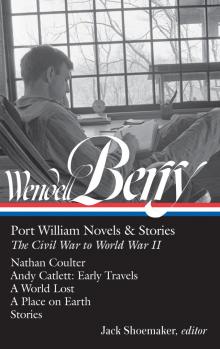 The Selected Poems of Wendell Berry
The Selected Poems of Wendell Berry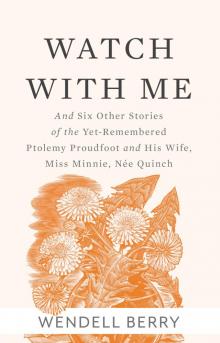 Watch With Me
Watch With Me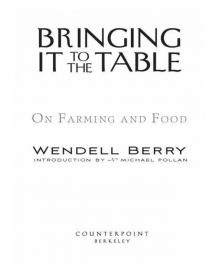 Bringing It to the Table: On Farming and Food
Bringing It to the Table: On Farming and Food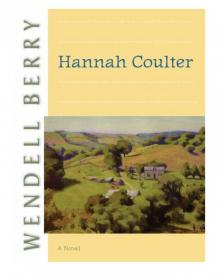 Hannah Coulter
Hannah Coulter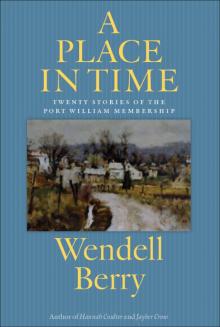 A Place in Time: Twenty Stories of the Port William Membership
A Place in Time: Twenty Stories of the Port William Membership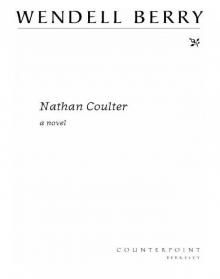 Nathan Coulter
Nathan Coulter Why I Am Not Going to Buy a Computer
Why I Am Not Going to Buy a Computer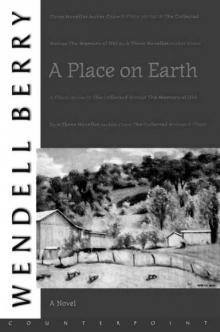 A Place on Earth
A Place on Earth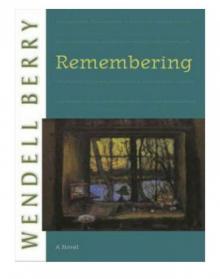 Remembering
Remembering New Collected Poems
New Collected Poems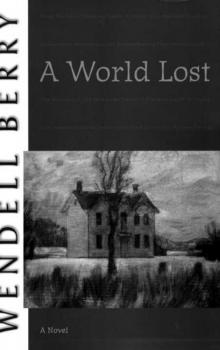 A World Lost
A World Lost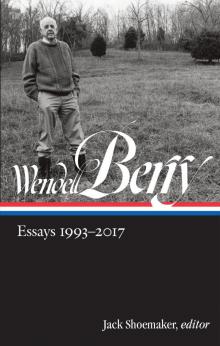 Wendell Berry
Wendell Berry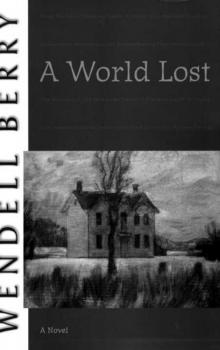 A World Lost: A Novel (Port William)
A World Lost: A Novel (Port William)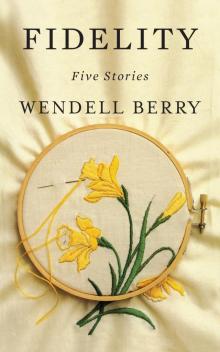 Fidelity
Fidelity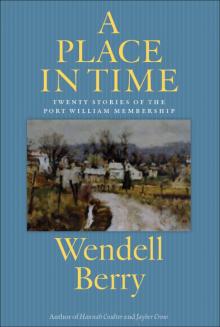 A Place in Time
A Place in Time